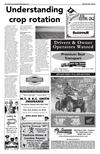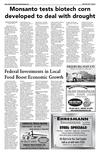15




March 20, 2012 • Page 15
shop online at www.missourivalleyshopper.com
Though it's easy for
suburbanites or city
dwellers to go months, if
not years, without seeing
a farm, the most recent
agriculture census for
which information is
available notes that in
2007 there were 2.1
million farms in the
United States. Those
farms spanned 922
million acres, shedding
light on the fact that while
many Americans might
not see farms on a daily
basis, that doesn't mean
the country isn't still a
great home to farmland.
While farming might
once have been a part of
most Americans' daily
lives, today the principles
of farming are much more
foreign to the average
American. One such
principle is crop rotation,
a valuable agricultural
practice that can even pay
dividends for suburban
homeowners who enjoy
gardening. The benefits of
crop rotation aren't only
applicable to large farms,
as they can help keep
personal gardens healthy
as well.
What Is Crop Rotation?
Crop rotation is a
practice farmers employ
to help their crops fight
disease. By growing a
variety of crops in a
sequential system
throughout their field,
farmers are hoping to
avoid the buildup of
disease and pests that is
common with monocropping, which is the
practice of growing the
same crop on the same
land year after year after
year. When rotating
crops, each succeeding
crop must belong to a
family different from the
previous crop.
Why Employ Crop
Rotation?
Crop rotation has
many benefits, arguably
the most important of
which is keeping pests
and disease at bay. Since
many pest insects and
disease-causing
organisms are host
specific, rotating crops
helps ensure these insect
pests and harmful
organisms cannot make a
permanent home or have
access to a permanent
source of food. If crops
aren't rotated, then the
insect pests and
organisms have a constant
source of food, enabling
them to live longer and do
more damage to crops as
a result.
But crop rotation isn't
only beneficial to crops.
Crop rotation can also
promote healthy soil.
Different crops have
different nutrient needs,
so rotating crops with
different nutrient needs
u
r
put y
o
Understanding
crop rotation
ing
vertis
ad
On the
CCCCutting Edge
You need the right tools to stay ahead
in business. One of those tools is creative,
competitive advertising. We can help you buzz
by your competition with custom graphics
and copywriting from our experienced staff.
SHOPPER
MISSOURI VALLEY
319 Walnut St., Yankton, SD • 665-7811
helps avoid the depletion
of any one element
present in the soil. Soil
structure is often better
when crops are rotated as
well. Some crops are
deep-rooting while others
are shallow rooting. By
alternating between the
two, planters can break up
any subsoil that might
have grown compacted.
Crop rotation also
offers environmental and
financial benefits by
reducing reliance on
synthetic chemicals to
fight pests. By rotating
crops, planters are making
it much harder for pests
to thrive, without having
to spend money on costly
and often
environmentally harmful
pesticides.
Drivers & Owner
Operators Wanted
Premium Best
Transport
1501 Wek Road
Yankton, SD 57078
Toll-Free: (800) 359-4084
605-665-9202 • Fax 605-665-0162
Cimpl Meats
1000 Cattle Dr., Yankton, SD • 665-1665
“Don’t Gamble” – Insure With
M.T. & R.C. SMITH
INSURANCE
Serving the Yankton Area Since 1949
... With Excellent Insurance Companies That We Represent!
HOME, AUTO, BUSINESS, LIFE, BONDS
204 W. 4th St. • Downtown Yankton, SD
Looking for
something
different?
Find the job you’ve
always wanted in the Help
Wanted Section of the
Missouri Valley Shopper!
605-665-3611
Spring Tuneup $49 95
Oil Change • Filter
Sharpen Blade
Spark Plug
Yankton Home &
Garden Repair
All Makes & Models!
SHOPPER
MISSOURI VALLEY
3302 West 8th St. Offering
605-665-2521
Cell: 661-4954 Dixon • Echo
Dolmar
3609 West 8th • Yankton
Ph. (605) 665-7433
(866) 293-7433
www.allseasonspowersportsinc.com





























 Previous Page
Previous Page





